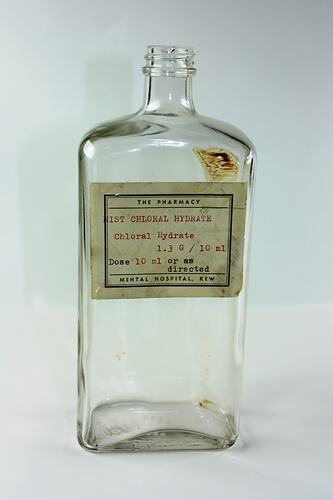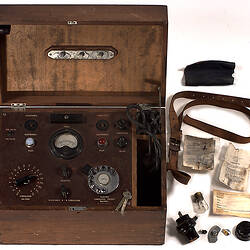Summary
Apothecary Jar used in the pharmacy of a Kew Mental Hospital. Chloral hydrate is a sedative and hypnotic. This drug induced a prolonged sleep - narcosis - and was used to sedate patients as a form of restraint. The treatment was commonly called 'sleeping away one's troubles.'
Chloral hydrate was one of a number of early psychiatric drugs employed in the management of psychiatric symptoms, and occasionally as a form of chemical restraint, at Kew Asylum. Others examples included potassium bromide, for its anti-convulsant and sedative effects, Laudanum (liquid opium) or opium "grains", morphine for its sedative and analgesic properties, and often brandy was given to ameliorate a broad variety of complaints.
Meanwhile, even into the early twentieth century some psychiatrists continued to subscribe to a form of the ancient humoural theory of medicine and often prescribed purgatives or laxatives. Humoral medicine is a theory of the workings of the human body that equates the four bodily "humours" of blood, phlegm, black bile and yellow bile with the four natural elements of fire, water, air and earth, where an excess or deficiency of one or more humours was seen as the cause of an illness. The correction of this imbalance would restore the patient's health and was achieved by the adminsitration of laxatives such as cod liver oil, castor oil or croton oil, and purgatives or emetics such as apomorphine which would cause vomiting to the point of exhaustion, after which the manic patient would be able to achieve the rest they needed.
Physical Description
Clear glass apothecary's jar (medicine bottle) has straight sides, and short neck. Has a white paper label printed in black and red. Contains small area of dry brown residue top corner of bottle.
More Information
-
Collection Names
-
Collecting Areas
-
Acquisition Information
Donation from Kew Mental Hospital (Asylum), Office of Psychiatric Services, May 1985
-
Place & Date Used
Kew Mental Hospital (Asylum), Kew, Greater Melbourne, Victoria, Australia, 1848-1950
-
Inscriptions
Text: MIST CHLORAL HYDRATE/CHLORAL HYDRATE/1.3g/10ml. Embossed on base: I/323/M/F1149.
-
Classification
Medicine & health, Mental health - pharmacy, Pharmaceuticals
-
Category
-
Discipline
-
Type of item
-
Overall Dimensions
8.8 cm (Length), 21 cm (Height), 493.2 g (Weight)
Total weight includes label.
-
Dimensions
0.06 mm (Length), 0.09 mm (Width), 210 mm (Height)
Measurement From Conservation. Measuring Method: measured standing upright
-
References
Martindale.
-
Keywords
Hospitals, Mental Health, Mental Health Institutions, Psychiatric Services, Psychiatric Hospitals, Psychiatric Institutions, Medicines, Medicinals & Drugs, Drugs

